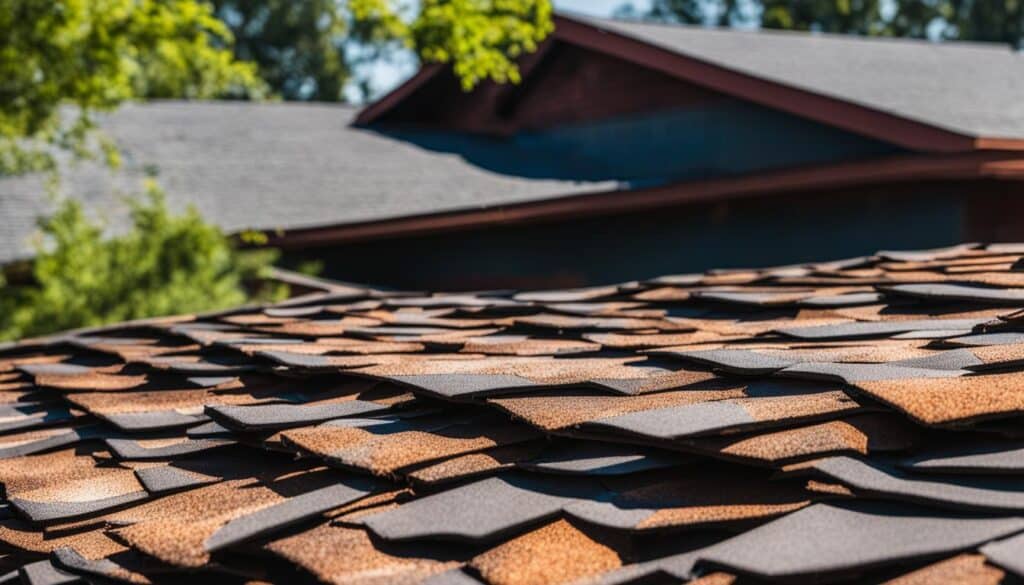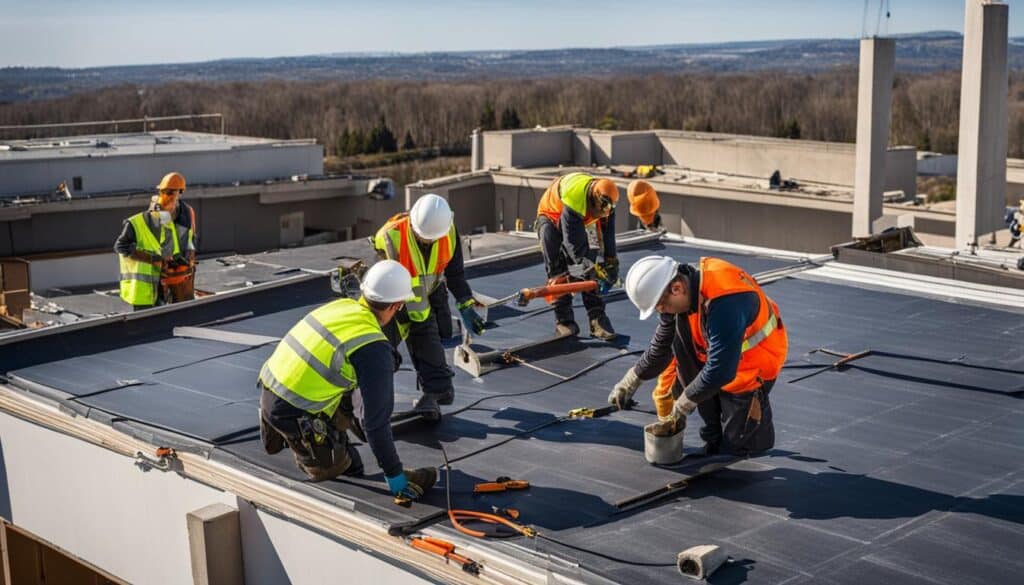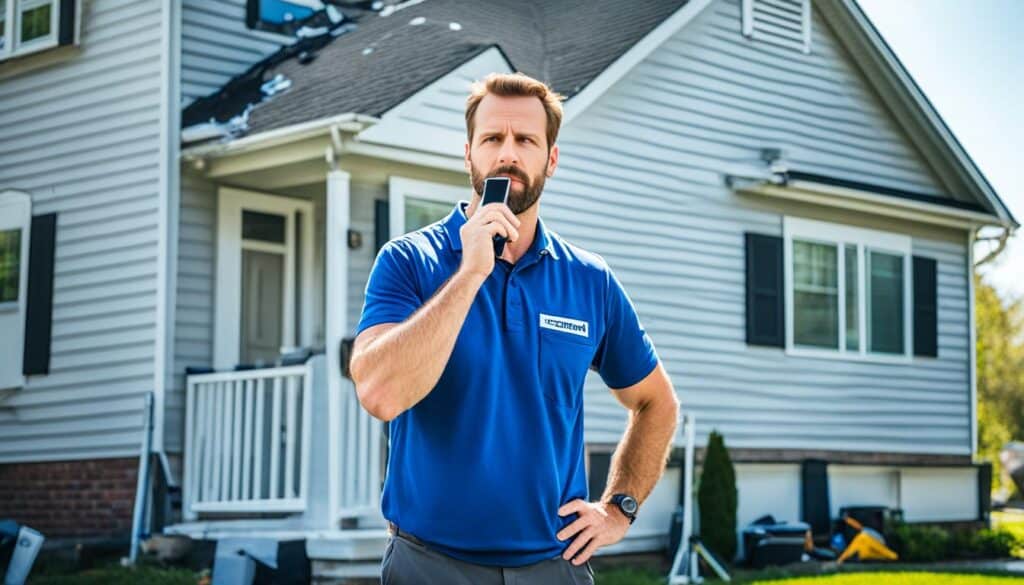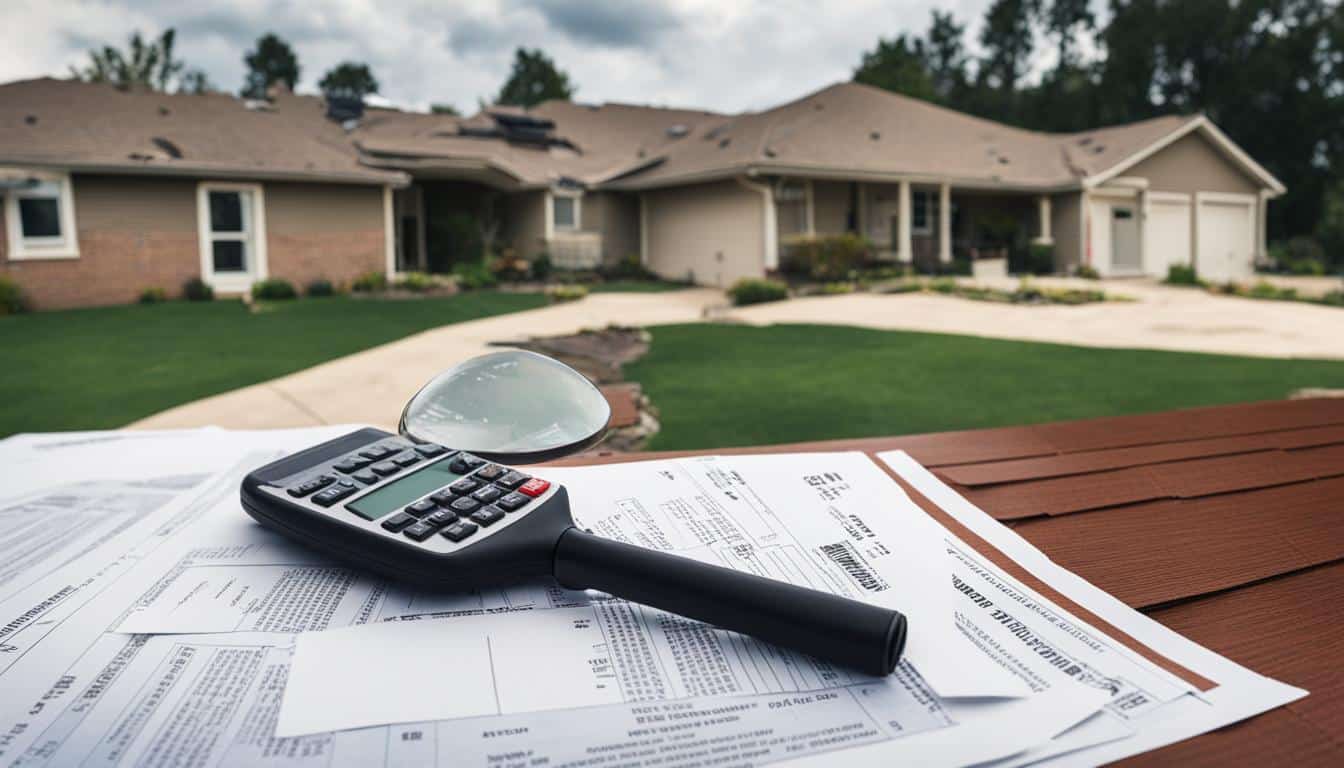When it comes to home maintenance, every homeowner wants to save money where they can. So, when you’re faced with a significant repair, such as a roof repair, you may wonder if you can get any relief come tax time. Can you deduct the cost of roof repairs from your taxes? It’s a question worth exploring to ensure you make the most of your financial resources.
Key Takeaways:
- Roof repairs are considered routine maintenance and are not tax deductible according to the IRS.
- Home improvements, such as roof replacements, qualify for tax deductions.
- Roof repairs made for medical or safety reasons may be eligible for tax deductions.
- Business owners have different tax rules for commercial roof repairs.
- Consulting with a professional roofing contractor is essential for accurate guidance on tax deductions and repairs.
Understanding Home Improvements and Repairs
In the realm of home maintenance, it’s important to distinguish between home improvements and repairs. While both play a vital role in keeping your humble abode in tip-top shape, they have different implications when it comes to tax deductions. Let’s delve deeper into what sets these two categories apart.
When we talk about home improvements, we’re referring to projects that not only enhance your home’s functionality and aesthetic appeal but also add tangible value. These can range from comprehensive roof replacements and kitchen remodels to bathroom renovations and window upgrades. Let’s face it, a gorgeous new roof not only keeps you dry but also boosts your home’s curb appeal. Similarly, a modernized kitchen or a stunning bathroom can significantly increase your property value.
In contrast, repairs are the routine maintenance tasks necessary for keeping your home in good condition. These include fixing minor issues like replacing a few shingles on a damaged roof, patching up a portion of a metal roof, or repairing a leaky faucet. Repairs are essential for ensuring the livability and functionality of your home but don’t necessarily add significant value in a monetary sense.
While repairs might enhance the comfort and longevity of your home, for tax purposes, they are not classified as home improvements. So, you won’t be eligible for the same deductions or benefits that come with improvements.
To summarize:
| Home Improvements | Repairs |
|---|---|
| Projects that add value | Routine maintenance |
| Enhance functionality and appeal | Keep your home in good condition |
| Increase property value | Don’t significantly increase value |
| Eligible for deductions | No deductions available |
So, while a new roof can improve the aesthetics and performance of your home, it’s essential to understand the distinction between repairs and improvements, especially when it comes to tax deductions.
Wrap-Up
Understanding the difference between home improvements and repairs is crucial, both in terms of enhancing your living space and navigating the tax landscape. So, whether you’re planning a full-blown remodel or just need to fix a few roof shingles, it’s important to know where your project falls on the spectrum.
Possibilities for Tax Deductions on Roof Replacements

When it comes to roof replacements, they are considered home improvements for tax purposes. Although you can’t deduct the cost of a roof replacement on your federal income taxes, it can increase the basis of your home. The basis is the amount of capital you invested in your property, which helps determine how much capital gains tax you may have to pay when selling the home. By increasing the basis through a roof replacement, you can reduce the taxable profit when selling the property.
Tax Deductions and the Basis of Your Home
To understand the tax implications of a roof replacement, it’s important to delve into the concept of the basis of your home. The basis is the value of your property for tax purposes. When you sell your home, the difference between the selling price and the basis is known as the capital gain. The capital gain is subject to capital gains tax.
By investing in a roof replacement, you are effectively increasing the basis of your home. This means that when you sell your property, the taxable profit will be reduced because the cost of the roof replacement is factored into the basis. This can help lower your capital gains tax liability.
It’s worth noting that the laws surrounding tax deductions, basis, and capital gains can be complex, and it’s always wise to consult with a tax professional to fully understand how these rules apply to your specific situation.
Understanding Capital Gains Tax
Capital gains tax is a tax on the profit you make from selling an asset, such as your home. The amount of capital gains tax you owe depends on your income level, the length of time you owned the property, and whether you qualify for any applicable deductions or exemptions.
When you sell your home, any profit above the basis is considered a capital gain. The capital gains tax is typically calculated based on the difference between the selling price and the adjusted basis, which includes the cost of the roof replacement and other relevant home improvements.
By increasing the basis through a roof replacement, you effectively reduce the taxable profit and potentially lower your capital gains tax liability. This can result in significant savings when it comes time to sell your home.
Consult a Tax Professional
While a roof replacement can impact your tax liability, it’s essential to consult with a qualified tax professional to ensure you understand all the relevant tax implications. They can provide personalized advice based on your specific circumstances and help you navigate the complex world of tax deductions, basis calculations, and capital gains tax.
Tax Deductions for Home Improvements and Safety Reasons
While roof repairs are not generally tax deductible, there are certain scenarios where they may qualify for deductions. If your doctor has recommended roof repairs or replacements for medical or safety reasons, you may be able to deduct the cost of the repairs. Additionally, if the repairs are made to improve the safety of your home, they may also be eligible for tax deductions. It’s crucial to consult a tax specialist for accurate information on how these deductions apply to your specific situation.
| Scenario | Tax Deductibility |
|---|---|
| Your doctor recommends roof repairs or replacements for medical reasons | Yes |
| Your doctor recommends roof repairs or replacements for safety reasons | Yes |
| Roof repairs made to improve the safety of your home | Yes |
| Roof repairs for general maintenance purposes | No |
| Roof repairs for cosmetic reasons | No |
Remember that documentation is crucial when claiming tax deductions for roof repairs. Keep detailed records of all expenses, including invoices, receipts, and any supporting documents from your doctor or safety experts. This will help ensure you have the necessary evidence in case of an audit. Consult with a tax professional to fully understand the requirements and eligibility criteria for home improvement tax deductions related to roof repairs.
Expert Tip:
Always consult a tax specialist before claiming any deductions. They can provide personalized advice based on your specific circumstances and will ensure that you are following all applicable tax laws and regulations.
Understanding Commercial Roof Repairs and Tax Consequences

As a business owner, you face different tax rules and regulations compared to homeowners. When it comes to commercial roof repairs and replacements, understanding the tax consequences is crucial. Under the Tax and Jobs Act, certain commercial roof repairs and replacements may qualify for depreciation and expensing. This opens up opportunities for tax savings.
To give you a clear picture, here’s a breakdown of the specific items that fall under the depreciation and expensing category:
| Items Eligible for Depreciation and Expensing |
|---|
| Roofs |
| HVAC systems |
| Fire protection systems |
| Alarm systems |
By leveraging these tax benefits, you can potentially offset the costs of commercial roof repairs and replacements and save your business money. However, it’s important to note that tax rules can change over time, so staying informed and seeking guidance from a tax specialist is essential to ensure you make the most of your tax options.
The Benefits of Depreciation and Expensing for Commercial Roof Repairs
Depreciation allows you to gradually deduct the cost of the roof repairs over several years. It recognizes the wear and tear on the roof and spreads out the deduction, providing significant tax savings. Expensing, on the other hand, allows you to deduct the entire cost of the repairs in the year they were made, providing an immediate tax benefit.
By strategically leveraging depreciation and expensing, you can effectively manage your business’s tax liabilities and improve your bottom line. Consult with a tax specialist who can guide you through the process and help you navigate the complexities of commercial roof repairs and their tax consequences.
Remember, understanding the tax benefits and consequences of commercial roof repairs is crucial for maximizing your business’s financial well-being. Stay informed, consult professionals, and make informed decisions that will benefit your business in the long run.
Finding a Reputable Roofer for Your Roof Repairs

When it comes to roof repairs, you want to make sure you find a reputable and experienced roofing contractor. After all, your roof is a vital component of your home’s protection and structural integrity. So, how do you go about finding the right roofer for your needs?
Ask for Referrals and Conduct Online Research
Start your search by asking for referrals from trusted sources such as family, friends, and neighbors. They may have firsthand experience working with a reliable roofing contractor and can provide valuable insights and recommendations.
In addition to referrals, take advantage of online research. Look for roofing contractors in your area and check their websites and online reviews. Look for companies that have positive customer testimonials and a solid reputation in the industry.
Contact Multiple Companies and Request Quotes
Once you have a shortlist of potential roofing contractors, it’s time to reach out to them and request quotes. Contact at least two or three companies to ensure you have a fair comparison. Be prepared to provide details about your roof repairs so that they can provide accurate estimates.
Review Quotes and Ask for References
When you receive the quotes, take the time to carefully review them. Make sure you are comparing the same services and materials to get an accurate idea of the costs involved. If something is unclear, don’t hesitate to ask for clarification.
Additionally, ask each roofing contractor for references. Contact these references to get a better understanding of the quality of their work and their overall satisfaction with the roofing contractor’s services.
Have a Written Agreement
Before hiring a roofing contractor, it’s important to have a written agreement that outlines all the details of the project. The agreement should clearly state the scope of work, the timeline for completion, and the payment expectations.
Having a written agreement helps protect both parties and ensures that everyone is on the same page. It eliminates any potential misunderstandings and provides a clear framework for the roof repair project.
Remember, finding a reputable roofer is essential for the success of your roof repairs. Take the time to do your research, ask for referrals, and request quotes from multiple companies. By following these steps, you can find a professional roofing contractor who will deliver high-quality workmanship and ensure your roof is in excellent condition.
Preventing Roof Leaks and Knowing When to Repair or Replace
When it comes to keeping your roof leak-free, a proactive approach is key. Start by ensuring your gutters are clean and in good repair. Clogged or damaged gutters can lead to water backing up and seeping into your roof. Regularly clearing debris and leaves from your roof will also help prevent water accumulation and potential leaks.
Trimming or removing overhanging tree branches is another important step. Branches rubbing against your roof can cause damage to the shingles and allow water to penetrate. By maintaining a safe distance between your roof and tree branches, you can prevent potential leaks.
Regular roof inspections are essential to catch any issues early on. A professional roofing contractor can identify small problems before they escalate into major leaks. They will assess the extent of the damage and provide recommendations on whether a repair or replacement is necessary.
Factors such as the extent of damage, age of the roof, and the type of roofing material will determine whether a repair or replacement is the best course of action. A reputable roofing contractor will guide you through the decision-making process, considering your budget and long-term goals.








